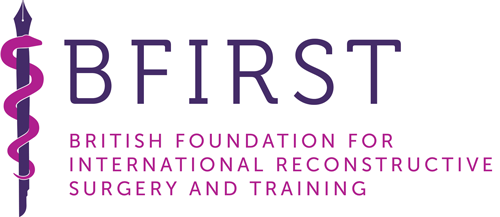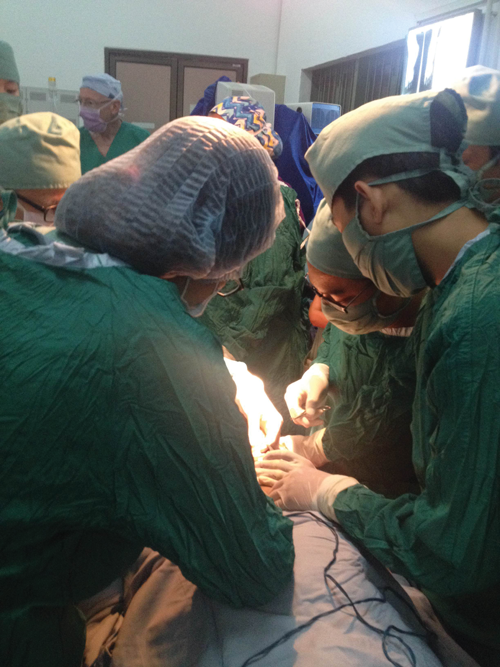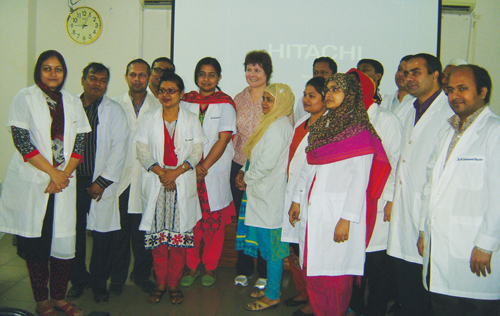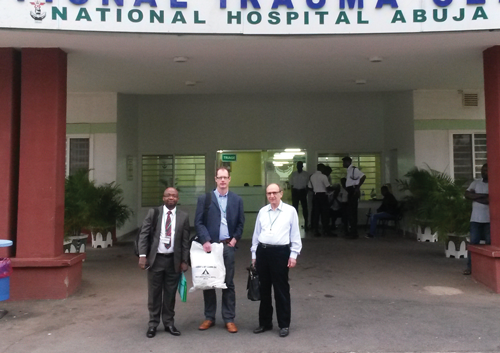Two of the UK’s most innovative Plastic Surgeons, Barbara Jemec and Wee Lam, give a fascinating account of the work of BFIRST overseas and, perhaps most importantly, explain how you can get involved.

The British Foundation for International Surgery and Training (BFIRST – www.bfirst.org.uk) is the British Association of Plastic, Reconstructive and Aesthetic Surgeons (BAPRAS) overseas charity, launched in 2014. BFIRST teach both surgeons , nurses and therapists in resource-poor countries reconstructive surgical techniques and supportive therapy best suited for their local communities.
UK-based surgeons have, of course, been involved in charitable work overseas for decades, but the emphasis of BFIRST is to offer a long-term commitment to the training of local doctors and nurses so that they can conduct the treatments themselves; safely and effectively.
BFIRST only attends at the invitation of surgeons in such countries; we ask them to analyse their case-mix, so that we can plan their training to provide the maximum benefit and without wasting time teaching things that the local hospitals either don’t need to know, or will never use.
We agree a curriculum with our hosts, and then deliver training in the subspecialty of reconstructive plastic surgery they have identified as being relevant to their needs (such as burns, hand surgery, lower limb trauma, etc.). This training is delivered both as lectures and one-on-one teaching, in both the outpatient clinic and in the operating theatre.

Local surgeons at the Children’s Hospital in Phnom Penh, Cambodia.
We offer feedback on the surgeons’ progress by assessing their level of competence at regular intervals in their management of the surgical problems they face, and – just as importantly – they assess us and our performance: we need to know whether our teaching methods and presentations are useful and appropriate for what they need to learn. It is a constant feedback model which improves the learning experience both for the local surgeons and for us, and it enables us to identify the best and most effective methods, which can of course also be shared amongst our other volunteers working in projects elsewhere in the world. This system also enables us, if an approach is not working, to realise that we have to change or replace it, rather than blithely persisting without providing any advantage to those who have asked for our help.
We also offer local surgeons six-week fellowships to visit UK plastic surgical units to work with the multidisciplinary teams here in their chosen fields.
We know that, for many conditions, surgery is not enough on its own and we therefore involve therapists in the postoperative rehabilitation which is so important in restoring movement and function to the patients we operate on (just as is the case here in the UK). Inspiring and teaching local staff to provide the therapy for patients undergoing surgery is a key part of the strategy, as without it the surgery cannot achieve its full potential to restore form and function. We engage specialist hand therapists for our upper limb and burns related projects.
We also believe that training should be consultant delivered. There are many reasons for this view (credibility, courtesy to one’s hosts, having the necessary breadth of experience, high levels of surgical skill, the ability to adapt to a profound lack of resources, and so on) but we feel strongly that those we help should be getting their training from someone who is a real expert in the practical work they are teaching. The BFIRST consultants delivering the training must be performing the surgery they are teaching in their day-to-day work.
For the UK surgeons and accompanying staff, the benefit is tremendous, on a personal level as well as a wider benefit to their own patients here, once they have returned.
The surgeons and staff gain a much wider clinical experience and skill set, having to solve problems with limited resources, which in turn hones their clinical acumen. The trips test their team working and leadership skills, they become better teachers and achieve a sense of pride in the work we do. This benefits all our patients and our students here.
We have a trainee arm of BFIRST, which seeks to engage our own trainees early in the ethos of training our colleagues abroad, and they are involved at all levels, apart from the actual training.
Current BFIRST projects
Cambodia
In Phnom Penh, Cambodia, Mr Wee Lam from the Royal Hospital for Sick Children in Edinburgh teaches brachial plexus surgery to the surgeons at The Children’s Surgical Centre. There are over 9000 road traffic accidents a year in Cambodia, 70% of which involve motorcycles and cause flail upper limbs (due to nerve injuries). Untreated, these limbs are useless, often to the point of being amputated, but reconstructive surgery can make these limbs useful for their owners again. Three years into the project, the local surgeons are now able to perform some brachial plexus reconstruction themselves, have been taught nerve surgery and uploaded their own educational videos on the CSC YouTube channel in the Khmer language for other doctors and for patients to view. We have also provided them with some of the microsurgical instruments required for their work.
Sri Lanka
In Colombo, Sri Lanka, at the Lady Ridgeway Hospital, Mr Bran Sivakumar from Great Ormond Hospital for Sick Children teaches the surgical management of congenital hand deformities, which is an unknown surgical skill there, despite 1000 children a year being born with deformed hands. Dr Alex Barnacle (an Interventional Radiologist) teaches the management of vascular malformations, which are potentially life-threatening conditions if not treated, as the patient can simply bleed to death from minor trauma.
Vietnam
At the VietDuc Hospital in Hanoi, Vietnam, Professor Simon Kay from the Leeds Teaching Hospital teaches on congenital hand surgery and brachial plexus injuries, sustained by babies after difficult obstetric deliveries, and BFIRST sponsored local Dr Huyen’s visit to Leeds, to work with our surgeons there and accelerate the training process. Mr Ken Stewart, from St John’s Hospital in Livingston, also teaches at VietDuc on the reconstruction of ears, and two of the surgeons from that hospital are due to attend the international conference on ear reconstruction in Beijing.
Bangladesh
In Dhaka, Bangladesh, Ms Barbara Jemec teaches on the reconstruction of hands after electrical burns (365,000 people suffer burns every year in Bangladesh, half of whom are children, and nearly 20% of these sustain a permanent disability largely due to lack of treatment). Mr Andy Williams from Chelsea & Westminster Hospital teaches reconstruction after severe burns at the Dhaka Medical College Hospital with Ms Jemec and has especially focused on the reduction of blood loss during surgery. In 2016, BFIRST donated a Dermatome – a specialised skin harvesting knife used in burns surgery under general anaesthetic, which leads to less severe scarring and much better restoration of healthy skin in the affected area, which is now being used daily at the unit.

Local surgeons and Barbara Jemec (Royal Free Hospital) at
the Dhaka Medical College Hospital, Bangladesh.
Last year, 2017, they returned with a senior hand therapist, Ms Zoe Clift, in order to start the rehabilitation in hands, especially of the necessary tendon transfers in electrical hand burns. They are also collecting data to streamline the treatment of these devastating injuries, and looking to fund another Dermatome as well as more blades.
Nepal
In Nepal, Miss Sarah Tucker from Oxford University Hospitals teaches reconstruction following lower limb trauma: the soft tissue cover of wide-open (or ‘compound’) fractures, without which the areas inevitably become infected, resulting either in fractures that never heal or even amputations of the limb. BFIRST also sponsored four Nepalese surgeons to attend a course on microsurgery here in the UK, to accelerate learning how to perform the relevant surgery (‘free tissue transfers’).
Nigeria
In Abuja, Nigeria, Mr Nadeem Khawja and Mr Zeeshan Sheikh, from the Manchester Centre for Plastic Surgery and Burns, are carrying on the work done by Mr Naguib El-Muttardi and Mr David Barnes (from St Andrew’s Plastic Surgery and Burns Unit in Chelmsford) to teach on the only burns course held in Nigeria, and led by Mr Rashed Ibrahim, one of our BFIRST Fellows. Five percent of all trauma deaths in Nigeria are due to burns, and the biggest group affected are children under five years of age. We aim to make the Nigerian Burns Course self-sufficient within three years.
Abdulrasheed Ibrahim (Abuja), David Barnes and Naguib El Muttardi (St Andrew’s Hospital, Chelmsford),
in Abuja for the Nigerian Association of Plastic and Reconstructive and Aesthetic
Surgeons, Nigerian Burn Injury Society and BFIRST Burns Course.
BFIRST continues to grow:
- Mr Neil Cahoon, from the Royal Hospital for Sick Children in Edinburgh, travelled to Ethiopia in April 2017 for BFIRST’s first visit there, and will be returning later this year with Mr Rupert Eckersley, Consultant Orthopaedic Surgeon from Chelsea and Westminster Hospital and a multidisciplinary team with the British Society for Surgery of the Hand (BSSH) to teach on a reconstructive hand surgery course.
- Mr David Bell (from Liverpool) and Mr Anthony Barrabas (from Hinchingbrooke Hospital NHS Trust) travelled to Sudan in a collaboration also with the BSSH to teach on the first course in hand surgery in Sudan.
- Mr Naveen Cavale visited Kenya in November 2017, to coincide with the country’s plastic surgery association meeting, to potentially initiate an appropriate reconstructive teaching programme.
- In January 2018, Mr Wee Lam and Mr Drew Flemming (St George’s Hospital, London) travelled to Zimbabwe with Mr Jason Wong and Mr Adam Reid (both from University Hospital Manchester) to teach on congenital hands and lower limb reconstruction.
How can the readership of The PMFA Journal help?
We are looking for contacts, lots of funding, volunteers and placement for our fellows. It costs £3500 per BFIRST fellow; this gives the opportunity for a surgeon to come to the UK to learn about their chosen field of reconstructive surgery, such as burns, hand surgery, facial reconstructive surgery, etc. for six weeks. We are looking for units who are willing to welcome BFIRST fellows for six weeks at a time.
“Inspiring and teaching local staff to provide the therapy for patients undergoing surgery is a key part of the strategy, as without it the surgery cannot achieve its full potential to restore form and function.”
Our current budget sustains five projects so we would also like to fund an expansion in projects. Each project costs around £5000 a year to fund, this includes a capped paid expenses for the doctors, nurses and therapists going, as well as travel for local doctors to attend meetings, special instruments and IT software, which will be of benefit to the local unit.
Consultant surgeons often pay their own travel and accommodation expenses as well as giving up their free time to do this work, but others (particularly if they do no private practice) and certainly the all-important nurses and therapists, need assistance with travel and accommodation costs. We don’t provide subsistence costs – that is for individuals to find themselves.
We are looking for consultants who have either a broad repertoire or a useful sub-speciality, and if we do not have a project they can immediately start, we will keep their names on a database for future use, but remember they must be practising the surgery they are going to teach.
 @BFIRSTraining
@BFIRSTraining
Declaration of competing interests: None declared.
COMMENTS ARE WELCOME


 www.bfirst.org.uk
www.bfirst.org.uk 


